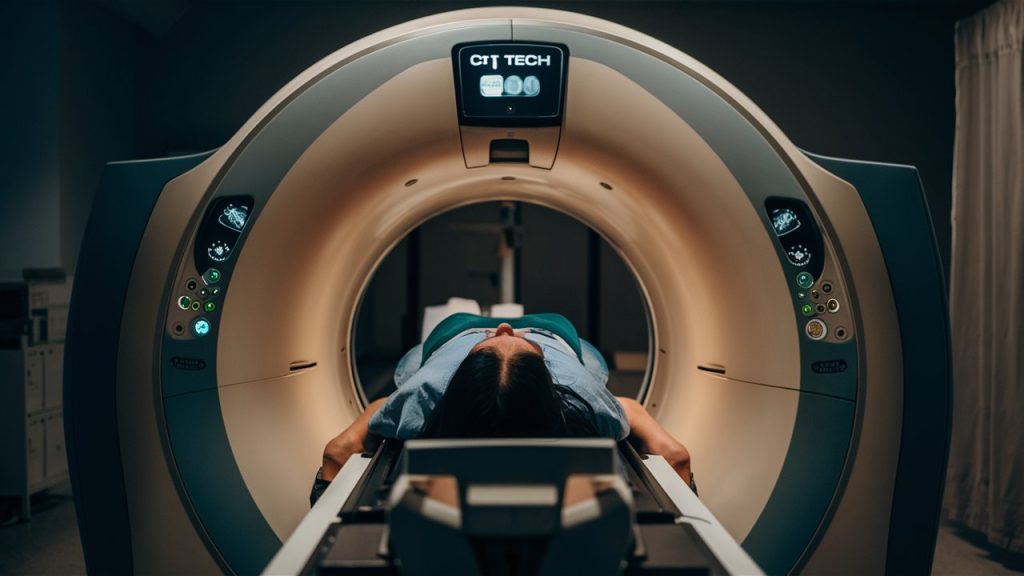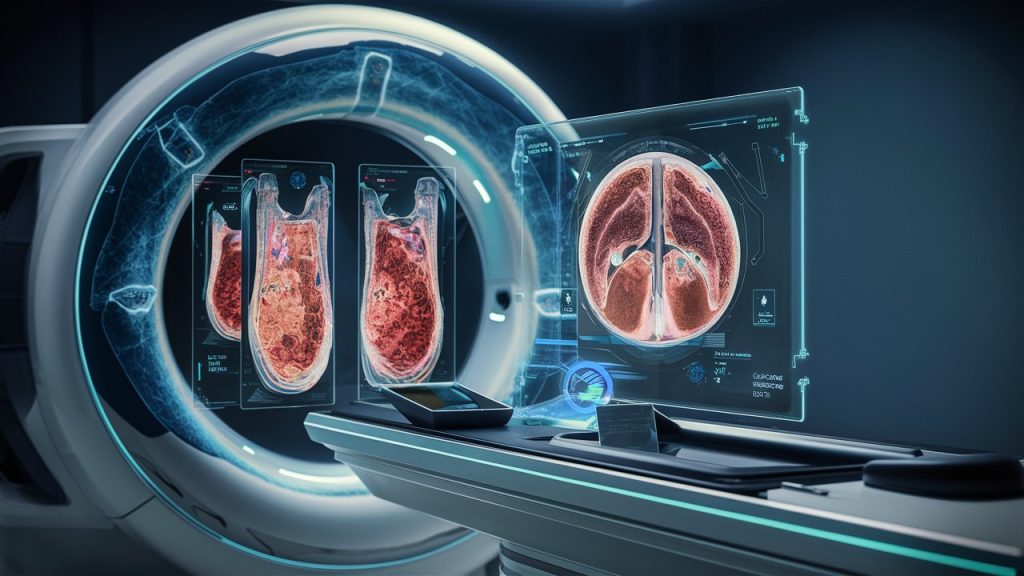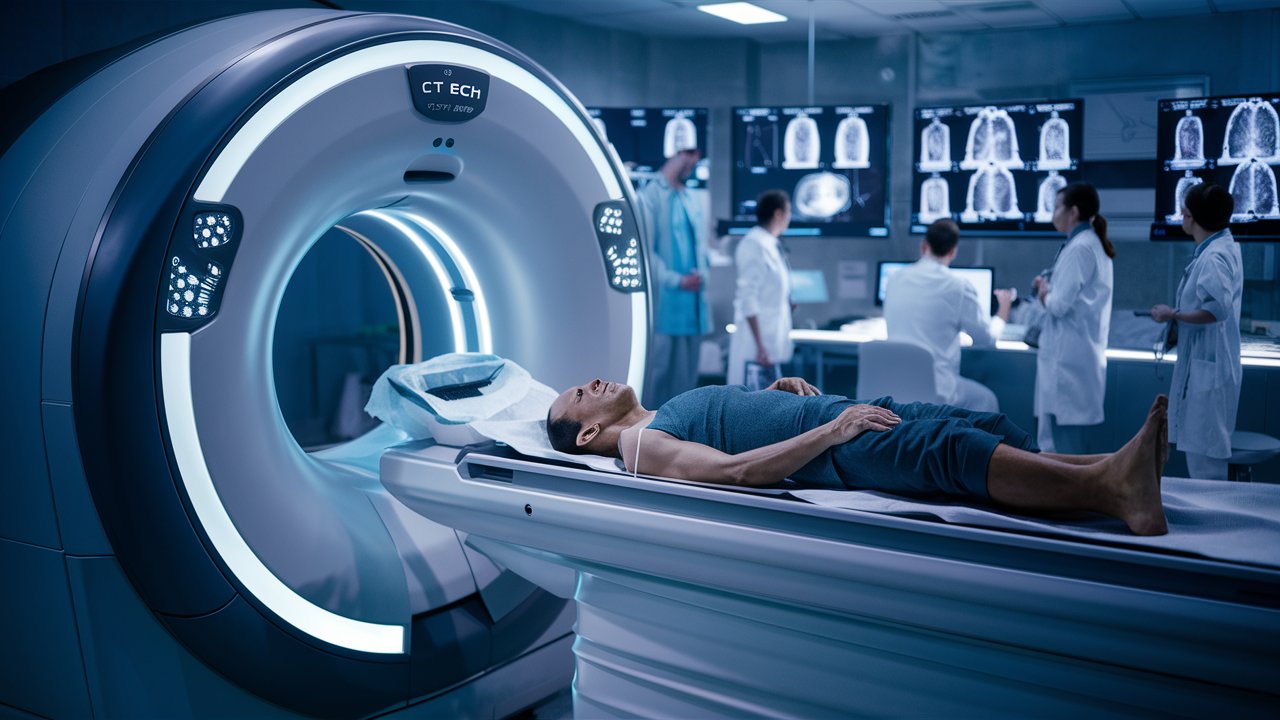Table of Contents
Medical imaging plays a critical role in modern healthcare, allowing doctors to see inside the human body without invasive procedures. Among the various imaging technologies available, CT scans are particularly important. But behind these complex machines are skilled professionals known as CT techs. So, what is a CT tech? This article delves deep into the world of CT techs, uncovering their roles, responsibilities, training, and the vital part they play in medical diagnostics.
Introduction to What is a CT Tech?
When you hear the term CT tech, you might picture advanced imaging machines found in hospitals. But what is a CT tech? A CT tech, or computed tomography technologist, is a specialized healthcare professional who operates CT scanners to create detailed images of the body’s internal structures. These images are crucial for diagnosing a wide range of medical conditions accurately and efficiently.
The Role of a CT Tech

What Does a CT Tech Do?
A CT tech’s primary responsibility is to perform CT scans. They are experts in using CT technology to capture detailed cross-sectional images of the body. Doctors then use these images to diagnose and monitor various medical conditions, from fractures to tumors.
Patient Preparation
Before a scan, a CT tech plays a key role in preparing the patient. They explain the procedure, answer any questions, and ensure the patient feels comfortable and at ease. This step is crucial as a relaxed patient can lead to better image quality. In some cases, the tech may need to administer a contrast dye to enhance the visibility of certain body structures in the images.
Operating the Scanner
Operating the CT scanner requires precision and expertise. The CT tech adjusts the machine’s settings based on the specific part of the body being examined and the patient’s needs. They must ensure that the images captured are clear and detailed while minimizing the patient’s exposure to radiation. This involves positioning the patient correctly and monitoring the scan process closely.
Image Review and Quality Control
Once the scan is complete, the CT tech reviews the images for quality and accuracy. They ensure that all necessary images have been captured and that they are clear enough for the radiologist to interpret. If any images are unclear or incomplete, the tech may need to perform additional scans.
Skills and Training Required
Education and Certification
To become a CT tech, one must complete an accredited radiologic technology program. This typically involves earning an associate degree, although some may pursue a bachelor’s degree for more advanced opportunities. After completing their education, aspiring CT techs must pass a certification exam, usually administered by organizations such as the American Registry of Radiologic Technologists (ARRT).
Continuing Education
The field of medical imaging is constantly evolving, with new technologies and techniques being developed regularly. To stay current, CT techs are required to participate in continuing education. This ensures they remain proficient in the latest imaging technologies and practices.
Important Skills
So, what is a CT tech’s skill set? CT techs need a unique blend of technical and interpersonal skills. They must be adept at operating complex imaging machinery and understanding the nuances of medical imaging software. Strong communication skills are essential for interacting with patients and healthcare teams. Additionally, attention to detail and the ability to follow strict protocols are critical for ensuring high-quality images and patient safety.
| Category | Details |
|---|---|
| Education and Certification | Complete an accredited radiologic technology program, usually earning an associate degree. Pass a certification exam administered by organizations such as the American Registry of Radiologic Technologists (ARRT). |
| Continuing Education | Participate in ongoing education to stay updated with new technologies and techniques in medical imaging. |
| Technical Skills | Proficient in operating complex imaging machinery and understanding medical imaging software. |
| Communication Skills | Strong communication skills for interacting with patients and healthcare teams. |
| Attention to Detail | Ability to follow strict protocols and ensure high-quality images. |
| Interpersonal Skills | Good interpersonal skills to calm and reassure patients, ensuring they are comfortable during the scan. |
The Importance of CT Techs in Healthcare

Diagnostic Accuracy
CT scans provide detailed images that are crucial for diagnosing a wide range of medical conditions. CT techs play a vital role in ensuring that these scans are performed accurately and efficiently. Their expertise directly impacts the quality of the images, which in turn affects the accuracy of the diagnosis.
Speed and Efficiency
CT techs contribute significantly to the speed and efficiency of the healthcare system. By performing scans quickly and effectively, they help doctors obtain the information they need to make timely decisions about patient care. In emergencies, the quick turnaround of CT scans can be lifesaving.
Working Environment and Conditions
Where Do CT Techs Work?
CT techs can work in various healthcare settings, including hospitals, outpatient imaging centers, and physician offices. Some may also work in specialized facilities such as cancer treatment centers or research institutions. Additionally, there are opportunities for CT tech to work in mobile imaging units that provide services in different locations.
Typical Workday
A typical day for a CT tech involves a mix of patient interaction, technical work, and collaboration with other healthcare professionals. They spend much of their time preparing patients for scans, operating the CT scanner, and reviewing images. They also perform routine maintenance on the equipment to ensure it functions correctly. The job can be physically demanding, often requiring the tech to stand for long periods and assist patients with mobility issues.
The Future of CT technology
Advancements in CT Imaging
What is a CT tech advancement in imaging? CT technology is continually advancing, with new developments making scans faster, more detailed, and safer for patients. Innovations such as dual-energy CT and spectral imaging are enhancing the diagnostic capabilities of CT scans. These advancements not only improve the accuracy of diagnoses but also allow for earlier detection of diseases.
Career Growth Opportunities
The demand for CT tech is expected to grow as the population ages and the need for medical imaging increases. So, what is a CT tech career outlook? CT tech have various opportunities for career advancement. They can specialize in specific areas, such as cardiovascular imaging or pediatric radiology. Additionally, experienced computed tomography technology may move into supervisory roles, become educators, or work in research and development.
Challenges Faced by CT Techs
Radiation Safety
One of the primary challenges CT technology faces is ensuring patient safety, particularly concerning radiation exposure. While CT scans involve higher doses of radiation compared to other imaging techniques, CT Techs are trained to minimize this exposure through proper machine settings and shielding techniques.
Patient Anxiety
Many patients feel anxious about undergoing CT scans, either due to fear of the procedure itself or the potential results. CT Techs must have the interpersonal skills to calm and reassure patients, ensuring they remain still and cooperative during the scan, which is crucial for obtaining clear images.
Technological Issues
What is a CT Tech’s technological issue? Like any advanced technology, CT scanners can sometimes malfunction or require maintenance. CT Techs must be able to troubleshoot issues quickly and effectively to minimize downtime and ensure patient care is not disrupted.
The Impact of CT Techs on Patient Care
Personalized Patient Care
What is a CT Tech’s contribution? CT techs contribute to personalized patient care by tailoring each scan to the individual needs of the patient. They consider factors such as the patient’s medical history, the specific area of concern, and any physical limitations when performing scans. This personalized approach helps ensure that the most accurate and useful images are obtained.
Collaborative Healthcare
What is a CT Tech’s work? CT techs work closely with radiologists, doctors, and other healthcare professionals to provide comprehensive care. They collaborate to ensure that the imaging results are accurate and that they contribute effectively to the patient’s diagnosis and treatment plan. This teamwork is essential for delivering high-quality healthcare.
Read more about Health information.
Final Thoughts
So, what is a CT tech? A CT tech is a highly skilled professional who plays a critical role in healthcare by performing CT scans that help diagnose and treat a wide range of medical conditions. Their expertise in operating complex imaging equipment, preparing patients, and ensuring the quality of the images is indispensable in modern medicine. As technology continues to advance, the role of CT tech will become even more important in the healthcare industry.
Understanding the value and responsibilities of a CT tech highlights their importance in the medical field. Whether you’re considering a career as a CT tech or are simply curious about medical imaging, it’s clear that CT techs are essential in revealing the mysteries inside our bodies. They are the unsung heroes of medical diagnostics, providing detailed images that help save lives and improve patient outcomes.
In the ever-evolving world of medical technology, it is important to understand what is a CT tech? CT techs stand at the forefront, ensuring that each scan is performed with precision, care, and a commitment to patient safety. Their work is a blend of science and compassion, making a significant impact on the lives of countless individuals. So next time you see a CT scan, remember the skilled CT tech behind the machine, working diligently to provide a clearer picture of our health.

